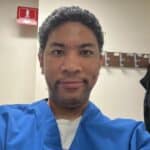Volume 38 Number 1 | February 2024
Christen Diel, MS-CLS, MLS(ASCP), ASCLS Diversity Advocacy Council Councilor-at-Large
Ryan J. Tom, MS, MLS(ASCP)CM, ASCLS Diversity Advocacy Council Chair


It is important to remember that promoting the principles of diversity, equity, inclusion, and belonging (DEIB) is relevant to patient care and the employee providing that care from within and beyond the walls of the laboratory. Current and prospective laboratorians, as well as patients, should feel accepted, represented, and included in the clinical laboratory science profession and services we provide. A strongly supported and practiced ethos of diversity may inspire new understandings of minority experiences. Promoting DEIB core values as a part of ASCLS is important to our communities, both socially and scientifically, by standing as a pillar of advocacy and providing an environment of awareness and belonging.
Cultivating a laboratory culture (and patient experience) of diversity, equity, inclusion, and belonging, is said to be a “journey, not a destination,” by author Julia Schmidt. With that said, we should understand that diversity within laboratory culture should not only apply to patients or personnel, but also the physical location and accessibility of the laboratory services. For example, laboratories in urban areas operate with larger, more complex patient populations and political environments than those in rural or less industrialized areas. Therefore, it is beneficial for each laboratory to identify what is lacking in one area/population and how other laboratories are able to compensate and overcome these obstacles. Diversity promotes an exchange of information and practices and can result in process improvement, increased efficiency, and patient safety.
“Current and prospective laboratorians, as well as patients, should feel accepted, represented, and included in the clinical laboratory science profession and services we provide.”
Physically accessible patient care areas are often a priority in laboratory design, but accessible laboratories are also needed for an inter-abled workforce. Employees may need spatial accommodations for walking assistance devices, instrument volume modifications for those with hearing loss, and those who have visual impairment (including colorblindness). Expanding DEIB efforts should also be seen at the education and recruitment levels. Increasing visibility and accessibility to laboratory professional programs (including international students) will increase the amount of potential workforce candidates. Educators and managers should strive to support students and employees with a variety of challenges and learning abilities, including dyslexia, dyscalculia, and those on the autism spectrum. It is paramount that we remain aware that like our patients, students and employees come into the laboratory with vastly different life and learning experiences.
Although the social climate and workforce have become more diverse over the years, there are always areas to improve our understanding of disability, racial, ethnic, religious, and sexual orientation/identity differences of our patients and coworkers. DEIB reminds us to take the time to understand and embrace these differences to allow others to feel like valued patients and/or team members. As a profession, we must learn to respect, include, and represent these various populations to improve a sense of belonging and trust within the communities and facilities in which we operate. It is imperative that we ask key questions:
- Who is in the lab/hospital?
- Who is trying to get in the lab/hospital but can’t; what are the barriers?
- Have everyone’s ideas and perspectives been heard, respected, and understood?
- Is everyone feeling valued through positive connections and interactions?
The Diversity Advocacy Council of ASCLS
As ASCLS has made it a core value of the organization to promote diversity, the Diversity Advocacy Council (DAC) was formed to ensure the principles of diversity, equity, inclusion, and belonging are communicated and encouraged in a social and fraternal atmosphere for organization members. ASCLS is an inclusive, culturally relevant community of people acknowledging their differences and unique characteristics; it is an organization where all persons can engage and participate meaningfully, empowering everyone to grow and learn. The DAC is a council of ASCLS members who are diverse in their race, ethnicity, nationality, sexual orientation, religion, gender, age, and laboratory professional status and work to advocate for the advancement of the ASCLS definition of diversity.
How Does the DAC Promote Diversity?
At the beginning of every year, the DAC hosts a virtual event called PRISM: Pride · Respect · Inclusion · Support · Momentum. The event celebrates and ignites discussions regarding diversity in the profession and the inequities in our healthcare system. With three interactive activities and a silent auction for the Glenda Price Diversity in Leadership Award, PRISM highlights diversity topics with Candid Conversations, Dynamic Discussions, and a book club. Visit ascls.org/prism for examples of speakers and topics covered since the first PRISM held in 2021.
Throughout the year, the DAC hosts other collaborative events where ASCLS members meet virtually to read a book or watch a movie together that focus on DEIB topics and allow for open dialogue about how these topics may influence how we as laboratory professionals operate in the workplace and exude these principles through our professional practice. This year’s book club featured The Diversity Gap: Where Good Intentions Meet True Cultural Change.
The most recent movie night featured Neurodivergent, a profoundly personal mixed media experience inside the ADHD mind of director Afton Quast Saler.
The DAC meets in person every summer at the ASCLS, AGT & SAFMLS Joint Annual Meeting where the annual DAC membership meeting is held, a panel discussion on the diversity theme of the year is presented, and a DAC social event is held at a local venue. If you are interested in participating in any of the DAC events or are interested in becoming a member of the DAC to learn more about or promote DEIB in the laboratory professional space, please visit the DAC: ascls.connectedcommunity.org/dac/home.
Christen Diel is Supervisor of Clinical Pathology Services for the Evening Shift Core Lab at Wellstar MCG Health in Augusta, Georgia.
Ryan J. Tom is a Lead Medical Technologist at Garnet Medical Center in Harris, New York.